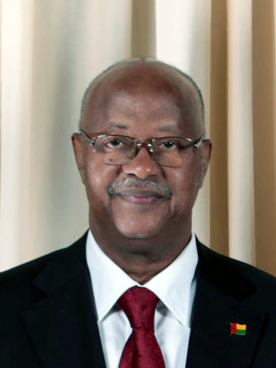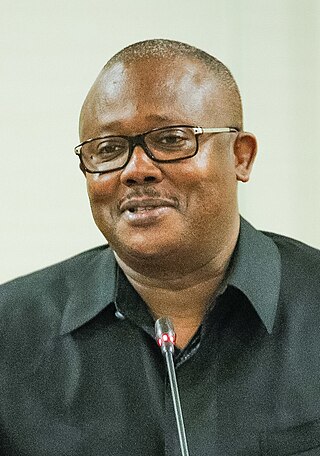Contents
| |||||
| Decades: | |||||
|---|---|---|---|---|---|
| See also: | |||||
Events in the year 2022 in Guinea-Bissau .
| |||||
| Decades: | |||||
|---|---|---|---|---|---|
| See also: | |||||
Events in the year 2022 in Guinea-Bissau .
Ongoing — COVID-19 pandemic in Guinea-Bissau

Guinea-Bissau, officially the Republic of Guinea-Bissau, is a country in West Africa that covers 36,125 square kilometres (13,948 sq mi) with an estimated population of 2,026,778. It borders Senegal to its north and Guinea to its southeast.
People have inhabited the region now known as Guinea-Bissau for thousands of years. In the 13th century, it became a province of the Mali Empire that later became independent as the Empire of Kaabu. Portugal claimed the region beginning in the 1450s. Portuguese control of the area was limited to several forts along the coast during most of this period. Portugal gained complete control of the mainland after the pacification campaigns of 1912–1915. The offshore Bijagos Islands were not colonized until 1936. After gaining independence in 1974, the country was controlled by a single-party system until 1991. The introduction of multi-party politics in 1991 brought the first multi-party elections in 1994. A civil war broke out in 1998 and lasted until 1999.

The politics of Guinea-Bissau take place in a framework of a semi-presidential representative democratic republic, with a multi-party system, wherein the President is head of state and the Prime Minister is head of government. Executive power is exercised by the government. Legislative power is vested in both the government and the National People's Assembly.

Kumba Ialá Embaló, also spelled Yalá, was a Bissau-Guinean politician who was president from 17 February 2000 until he was deposed in a bloodless military coup on 14 September 2003. He belonged to the Balanta ethnic group and was President of the Social Renewal Party (PRS). In 2008 he converted to Islam and took the name Mohamed Ialá Embaló. He was the founder of the Party for Social Renewal. In 2014, Ialá died from a cardiopulmonary arrest.

Carlos Domingos Gomes Júnior is a Bissau-Guinean politician who was Prime Minister of Guinea-Bissau from 10 May 2004 to 2 November 2005, and again from 25 December 2008 to 10 February 2012. He has been the President of the African Party for the Independence of Guinea and Cape Verde (PAIGC) since 2002 and is widely known as "Cadogo". He resigned as prime minister on 10 February 2012 to run in the presidential election triggered by President Malam Bacai Sanhá's death on 9 January.

João Bernardo "Nino" Vieira was a Bissau-Guinean politician who served as President of Guinea-Bissau from 1980 to 1999, except for a three-day period in May 1984, and from 2005 until his assassination in 2009.

The Casamance conflict is an ongoing low-level conflict that has been waged between the Government of Senegal and the Movement of Democratic Forces of Casamance (MFDC) since 1982. On May 1, 2014, the leader of the MFDC sued for peace and declared a unilateral ceasefire.

On 12 April 2012, a coup d'état in Guinea-Bissau was staged by elements of the armed forces about two weeks before the second round of a presidential election between Carlos Gomes Júnior and Kumba Ialá. The coup started in the evening with military personnel and equipment making its way onto the streets, followed by the state-owned media being taken off-air.
José Américo Bubo Na Tchuto is an admiral in the Navy of Guinea-Bissau. He was previously Chief of Staff of the Navy. On August 6, 2008, he was behind a failed coup attempt against President João Bernardo Vieira. He fled to the Gambia after the coup before returning to Guinea Bissau in 2009 following Vieira's assassination.

Umaro Mokhtar Sissoco Embaló is a Bissau-Guinean politician serving as the president of Guinea-Bissau since February 2020. He is a political scientist and military officer who previously served as prime minister between November 2016 and January 2018.

Presidential elections were held in Guinea-Bissau on 24 November 2019. As no candidate received a majority of the vote, a second round was held on 29 December. Incumbent president José Mário Vaz finished fourth in the first round of voting, failing to progress to the runoff. Umaro Sissoco Embaló won the second round with 54% of the vote, becoming the first president to be elected without the backing of the PAIGC.
The political history of Africa in the 2020s covers political events on the continent, other than elections, from 2020 onwards.

A coup d'état was attempted in Guinea-Bissau on 1 February 2022. A few hours later, president Umaro Sissoco Embaló declared the coup over, he said that "many" members of the security forces had been killed in a "failed attack against democracy".

On February 8, 2022, Félix Tshisekedi, the president of the Democratic Republic of the Congo, reported a coup d'état. The reports of a coup emerged when Tshisekedi was attending the African Union summit in Addis Ababa, of which he is the chairperson. The reports caused Tshisekedi to leave the summit early to deal with the internal conflict in his country.

Snap parliamentary elections were held in Guinea-Bissau on 4 June 2023. Incumbent president Umaro Sissoco Embalo dissolved the parliament on 16 May 2022, accusing deputies of corruption and "unresolvable" differences between the National People's Assembly and other government branches.
Events in the year 2023 in Guinea-Bissau.

On 30 November–1 December 2023, clashes broke out in Bissau, the capital of Guinea-Bissau, between government forces and units of the National Guard who had released two ministers accused of corruption from detention. The clashes led to the arrest of National Guard commander Colonel Victor Tchongo. President Umaro Sissoco Embaló described the events as an attempted coup. Following the clashes, Embaló ordered the dissolution of the country's legislature.

Snap parliamentary elections are scheduled to be held in Guinea-Bissau on 24 November 2024. Incumbent president Umaro Sissoco Embalo dissolved the opposition controlled parliament on 4 December 2023, saying an "attempted coup" had prevented him from returning home from COP28 climate conference.

Presidential elections are scheduled to be held in Guinea-Bissau in November or December 2024. Incumbent president Umaro Sissoco Embaló is eligible for a second term.